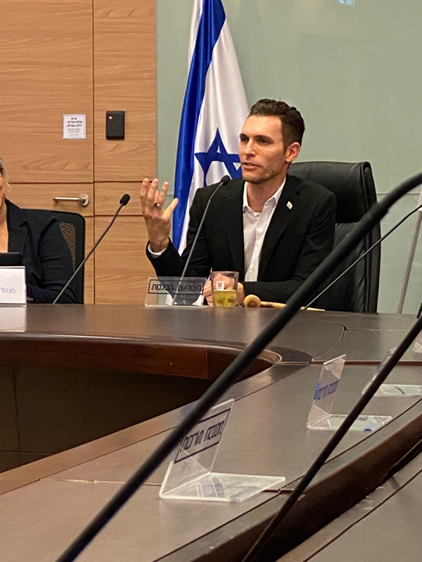Our third day was a rollercoaster of emotions. We began at the Hebrew Union College-Jewish
Institute of Religion. All Reform American Rabbinic, Cantoral and Education
students spend their first ear of studies at HUC-JIR Jerusalem. I studied there in 1982. All Israeli Reform
Rabbis spend their entire time at the Jerusalem Campus. This morning, our group
was joined by Israeli Rabbinic Colleagues and we studied the concept of Pidyon
Shvuyim – the redemption of Captives – with the Rabbi Dr. Dalia Marx –
professor of Rabbinics. Our discussion was deep and heartfelt.
We then travelled to the Knesset where we met with two elected
officials (MK’s) – Rabbi Gil Kariv – of the labor party and the first Israeli
Reform rabbi to serve as an elected official in the Israeli parliament, and
Idan Roll of the Yesh Atid party. Rabbi Kariv spoke to us about the fact
that this moment in history is unprecedented – especially in terms of Israel’s
relationship with the diaspora. This posited that Israel is facing both a
crisis and a moment of clarity. The fact that the vast majority of world Jewry
stands with Israel at this difficult time cannot be minimized. As anti-Semitism
raises its ugly head around the world, our communities are linked- not only
symbolically, but existentially. He also stressed the fact that President
Biden’s support of Israel has been unequivocal and apolitical. The fact that
the president of the United States took it upon himself to travel here in a
time of war, extend massive military support and strengthen our relationship
cannot be minimized.
He also shared that we need to see this conflict as existential. Hamas does not have the ability to defeat Israel’s military, but they can destroy the concept of a 2-state solution. Also – if Hamas is not completely eliminated, they will destroy the Palestinian Authority (PA) – the only other option for leadership in the Palestinian community – and the only hope for moderation. He has no love for the PA, but he knows that they are the last gasp for any hope of a negotiated solution.
Rabbi Kariv also shared his concerns
about the extremists in the current government.
He shared that their racist and isolationist agenda may have been paused
by the war, but they are waiting to impose their will on society as soon as
they can. The sense of solidarity that is prevalent during wartime will most
certainly dissolve once some semblance of normalcy returns. He warned us that
the same ministers who are preaching Jewish unity are also eager to strip
Reform and secular Jews, women, minorities and the LGBTQ+ communities of their
rights.
(MK Rabbi Gilad Kariv)
(MK Idan Roll)
MK Roll shared much of Rabbi Kariv’s positions – even though they come from
different political parties. He told us that this war will not be quick or
easy. He also shared that he believed that when the war is finally over, there
will be a new governing coalition in place. Netanyahu will not be able to
survive the multiple failures of leadership that preceded this crisis.
We spoke about many other issues with these two remarkable
leaders- including:
·
The current financial
burdens that Israel is facing;
·
The role of NGO’s and civil
society in dealing with this crisis and replacing the government in many arenas;
·
The potential for war in
the North with Hezbolah;
·
The plans (or lack thereof)
for next steps after the war;
I don’t have space or time to list them all – but I will share more upon my return next week.
After we left the Knesset, we drove to Tel Aviv to meet with
Lee and Shelly Siegal. Lee’s brother, Keith Segal and Sister-in-law, Aviva were
captured on October 7th from their home in Kibbutz K’far Aza.
Thankfully, Aviva was one of the hostages to be freed in recent exchanges, but
Keith is still in captivity. They could
not share many details of their loved ones’ ordeals, but the pain, fear and
worry that they shared was palpable. They also told us how important it was to
have the presence of the Hostage and Family Forum – a group of volunteers that,
literally overnight, came together to offer support, raise funds, and provide
respite for the families of the hostages. They were grateful for the
overwhelming solidarity they have experienced, but, until every hostage is
returned home safely, they will not be able to rest.
Our day ended on a very powerful note as we visited Kikar Ha Hatufim – “Hostage Square” – the gathering place for families of those who were captured and all those who support them- outside of the Tel Aviv museum. This has become a truly sacred space. It is here that a symbolic table has been set with places for all those who were captured. There are art installations, information booths and, most importantly, circles of chairs set up for those who need to sit in silence, give or receive comfort to all who are in pain. I was honored to lead a short song and prayer circle in Hebrew and English.
(Link to video of Misheberach at Hostage Square on Facebook: https://www.facebook.com/1081958072/videos/pcb.10226376342929880/6919164458171366)
We returned to Jerusalem with heavy hearts – but a sense of connection with everyone who is grieving in the amazing country.
L’Shalom,
Rabbi Joseph R. Black




No comments:
Post a Comment